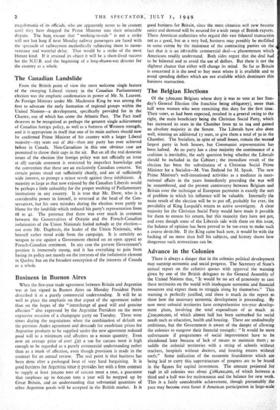The Canadian Landslide
From the British point of view the most welcome single feature of the sweeping Liberal victory in the Canadian Parliamentary election was the emphatic confirmation in power of Mr. St. Laurent. As Foreign Minister under Mr. Mackenzie King he was among the first to advocate the early formation of regional groups within the United Nations—a development, specifically provided for in the Charter, out of which has come the Atlantic Pact. The Pact itself deserves to be recognised as perhaps the greatest single achievement of Canadian foreign policy, as well as a buttress of Western strength, and it is appropriate in itself that one of its main authors should now be confirmed Prime Minister of his country with a larger Liberal majority-193 seats out of 262—than any party has ever achieved before in Canada. Non-Canadians in this one obvious case arc permitted to throw their caps in the air. But on all the real domestic issues of the election (for foreign policy was not officially an issue at all) outside comment is restricted by imperfect knowledge and the convention that these are an exclusively Canadian concern. Yet certain points stand out sufficiently clearly, and are of sufficiently wide interest, to prompt a minor revolt against these inhibitions. A majority as large as that now enjoyed by the Canadian Liberals would be perhaps a little unhealthy for the proper working of Parliamentary institutions in any country. It is true that Mr. Drew, who is a considerable power in himself, is returned at the head of the Con- servatives, but his own mistakes during the election were partly to blame for the landslide which reduced his party's representation from 68 to 42. The pretence that there was ever much in common between the Conservatives of Ontario and the French-Canadian isolationists of the Union Nationale fooled nobody at the election— not even Mr. Duplessis, the leader of the Union Nationale, who himself rather stood aside from the campaign. It is certainly no weapon to use against a Government elected on an open appeal to French-Canadian sentiment. In any case the present Government's position is immensely strong, and it has everything to gain from basing its policy not merely on the interests of the isolationist element in Quebec but on the broadest conception of the interests of Canada as a whole.






































 Previous page
Previous page